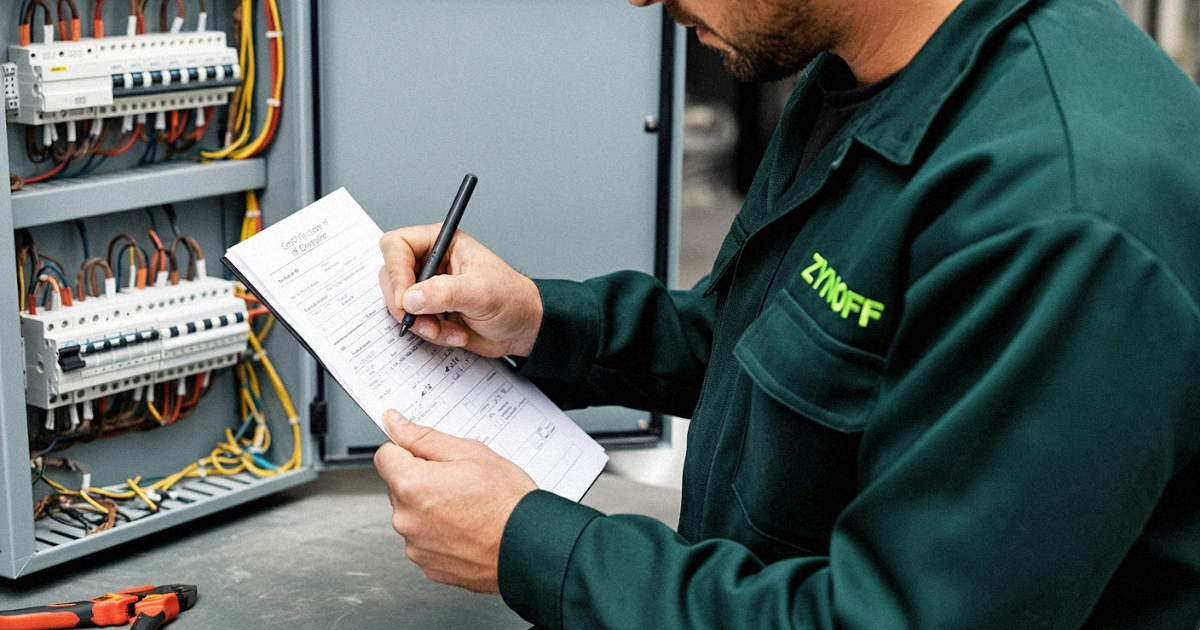Electrical safety is fundamental to building and property maintenance in New Zealand. Ensuring compliance with stringent safety standards is a legal obligation and a crucial measure to protect lives, property, and the integrity of electrical systems. The maintenance of electrical safety depends significantly on the Certificate of Compliance (CoC). This guide presents detailed information about Certificate of Compliance standards, their vital role, and their mandated usage situations.
What is a Certificate of Compliance (CoC)?
A Certificate of Compliance (CoC) is a legally mandated document issued by a licensed electrician upon completing fixed electrical work. This document validates that the work meets standards defined in New Zealand’s Electricity Act 1992 and related amendments to the Electricity (Safety) Regulations 2010. The certificate verifies that electrical installations and all repairs maintain the country’s strict safety requirements.
When is a CoC Required?
A CoC is required for all significant electrical work, including:
- New electrical installations, such as wiring in new buildings.
- Alterations or additions to existing circuits.
- Rewiring projects.
- Installation of new power points or light fixtures.
- Any prescribed electrical work, including high-risk jobs like installations in hazardous areas (e.g., areas with explosive atmospheres).
The replacement of light bulbs and fuses falls under routine maintenance, which does not need a CoC. Before a power supply connection can happen, all high-risk prescribed electrical work requires another inspection from a licensed electrical inspector.
Who Can Issue a CoC?
Only licensed electricians with a valid practising licence from the Electrical Workers Registration Board (EWRB) are authorised to issue a CoC. Homeowners should always verify the credentials of their electricians by requesting to see their licence or checking the EWRB’s online register.
What Information Does a CoC Contain?
A CoC provides detailed documentation of the completed electrical work, including:
- The type and scope of work performed.
- The date and location of the work.
- The name, registration number, and signature of the licensed electrician.
- A declaration confirming compliance with New Zealand’s electrical safety regulations.
An Electrical Safety Certificate (ESC) is also required for prescribed electrical work connected to a power supply. The certificate shows that the installation meets the required safety standards and poses no user risks.
Why is a CoC Important?
- Safety Assurance: The CoC demonstrates safety assurance when performing electrical work by proving that operations were conducted without risks such as electric shocks, fires, or other hazards.
- Legal Compliance: Prescribed electrical work requires New Zealand law to issue a CoC because of its mandatory legal requirement. Refusal to follow these requirements might lead to penalties.
- Insurance Requirements: Most insurance companies require a Certificate of Compliance (CoC) to verify electrical compliance standards for processing claims related to electrical malfunctions.
- Property Transactions: During property sales, solicitors or buyers often request CoCs as proof of the safety and compliance of electrical systems.
Additional Documentation: Electrical Safety Certificates (ESCs)
In addition to the CoC, an Electrical Safety Certificate (ESC) is required for all prescribed electrical work connected to a power supply. This document certifies explicitly that the electrical installation is safe for use. Together, these certificates serve as essential records for ensuring legal and safety compliance.
Record Keeping
Proper record keeping of CoCs and ESCs is crucial:
- Homeowners: Retain these certificates for at least seven years for future reference during renovations, repairs, or insurance claims.
- Electricians: Legally required to keep copies for a minimum of seven years.
How Does This Relate to Property Sales?
While a CoC is not always mandatory for selling a property, having up-to-date certificates can significantly streamline the process. These documents assure buyers that the property’s electrical systems meet safety standards. Missing documentation can lead to delays or reduced buyer confidence.
Role of Electrical Inspectors
Installation projects located in dangerous areas and main parallel generation system work require examination by licensed electrical inspectors. This extra inspection step confirms that the highest possible safety requirements are enforced.
New Zealand uses the Certificate of Compliance (CoC) as the essential document for maintaining national electrical safety. Every stage of electrical work requires understanding and obtaining a Certificate of Compliance. Electricians must check professional standards since homeowners need it to commission the work. In contrast, property buyers need it for safety verification. Implementing legal requirements benefits property protection and supports national public safety activities throughout New Zealand.




